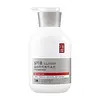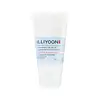What's inside
What's inside
 Key Ingredients
Key Ingredients

No key ingredients
 Benefits
Benefits

 Concerns
Concerns

 Ingredients Side-by-side
Ingredients Side-by-side

Water
Skin ConditioningGlycerin
HumectantPentaerythrityl Tetraethylhexanoate
EmollientHydrogenated Poly(C6-14 Olefin)
EmollientPanthenol
Skin ConditioningButyrospermum Parkii Butter
Skin ConditioningC14-22 Alcohols
Emulsion StabilisingPanax Ginseng Root Extract
EmollientPinus Koraiensis Seed Oil
PerfumingCamellia Oleifera Leaf Extract
AstringentNelumbo Nucifera Germ Extract
Skin ConditioningSesamum Indicum Seed Oil
EmollientPrunus Armeniaca Kernel Oil
MaskingPrunus Mume Fruit Extract
HumectantSqualane
EmollientC12-20 Alkyl Glucoside
EmulsifyingGlyceryl Stearate
EmollientGlyceryl Caprylate
EmollientButylene Glycol
HumectantBis-Diglyceryl Polyacyladipate-2
EmollientCetearyl Alcohol
EmollientStearic Acid
CleansingXanthan Gum
EmulsifyingCarbomer
Emulsion StabilisingPalmitic Acid
EmollientPolysorbate 20
EmulsifyingPolyacrylate-13
Polyisobutene
Dimethicone
EmollientEthylhexylglycerin
Skin ConditioningDisodium EDTA
1,2-Hexanediol
Skin ConditioningPotassium Hydroxide
BufferingParfum
MaskingWater, Glycerin, Pentaerythrityl Tetraethylhexanoate, Hydrogenated Poly(C6-14 Olefin), Panthenol, Butyrospermum Parkii Butter, C14-22 Alcohols, Panax Ginseng Root Extract, Pinus Koraiensis Seed Oil, Camellia Oleifera Leaf Extract, Nelumbo Nucifera Germ Extract, Sesamum Indicum Seed Oil, Prunus Armeniaca Kernel Oil, Prunus Mume Fruit Extract, Squalane, C12-20 Alkyl Glucoside, Glyceryl Stearate, Glyceryl Caprylate, Butylene Glycol, Bis-Diglyceryl Polyacyladipate-2, Cetearyl Alcohol, Stearic Acid, Xanthan Gum, Carbomer, Palmitic Acid, Polysorbate 20, Polyacrylate-13, Polyisobutene, Dimethicone, Ethylhexylglycerin, Disodium EDTA, 1,2-Hexanediol, Potassium Hydroxide, Parfum
Water
Skin ConditioningButylene Glycol
HumectantGlycerin
HumectantEthylhexyl Stearate
EmollientDimethicone
EmollientDicaprylyl Carbonate
EmollientBehenyl Alcohol
EmollientStearic Acid
CleansingPalmitic Acid
EmollientCetyl Ethylhexanoate
EmollientHydrogenated Poly(C6-14 Olefin)
Emollient1,2-Hexanediol
Skin ConditioningArachidyl Alcohol
EmollientC14-22 Alcohols
Emulsion StabilisingCetyl-Pg Hydroxyethyl Palmitamide
Skin ConditioningPolyacrylate-13
Mannitol
HumectantArachidyl Glucoside
EmulsifyingC12-20 Alkyl Glucoside
EmulsifyingHydrogenated Polyisobutene
EmollientGlyceryl Caprylate
EmollientEthylhexylglycerin
Skin ConditioningPolyglyceryl-10 Laurate
Skin ConditioningHydrogenated Lecithin
EmulsifyingEthylhexyl Palmitate
EmollientDimethiconol
EmollientPanax Ginseng Root Water
MaskingCarbomer
Emulsion StabilisingSorbitan Isostearate
EmulsifyingAcrylates/Ammonium Methacrylate Copolymer
Scutellaria Baicalensis Root Extract
AstringentPropanediol
SolventCholesterol
EmollientSilica
AbrasivePrunus Mume Fruit Extract
HumectantArachidic Acid
CleansingGlycine Max Oil
EmollientSqualane
EmollientMadecassoside
AntioxidantPolyglyceryl-10 Pentastearate
Skin ConditioningTocopherol
AntioxidantCeramide NP
Skin ConditioningOleic Acid
EmollientPhytosphingosine
Skin ConditioningPentylene Glycol
Skin ConditioningDipotassium Glycyrrhizate
HumectantCanola Oil
EmollientRosmarinus Officinalis Leaf Extract
AntimicrobialWater, Butylene Glycol, Glycerin, Ethylhexyl Stearate, Dimethicone, Dicaprylyl Carbonate, Behenyl Alcohol, Stearic Acid, Palmitic Acid, Cetyl Ethylhexanoate, Hydrogenated Poly(C6-14 Olefin), 1,2-Hexanediol, Arachidyl Alcohol, C14-22 Alcohols, Cetyl-Pg Hydroxyethyl Palmitamide, Polyacrylate-13, Mannitol, Arachidyl Glucoside, C12-20 Alkyl Glucoside, Hydrogenated Polyisobutene, Glyceryl Caprylate, Ethylhexylglycerin, Polyglyceryl-10 Laurate, Hydrogenated Lecithin, Ethylhexyl Palmitate, Dimethiconol, Panax Ginseng Root Water, Carbomer, Sorbitan Isostearate, Acrylates/Ammonium Methacrylate Copolymer, Scutellaria Baicalensis Root Extract, Propanediol, Cholesterol, Silica, Prunus Mume Fruit Extract, Arachidic Acid, Glycine Max Oil, Squalane, Madecassoside, Polyglyceryl-10 Pentastearate, Tocopherol, Ceramide NP, Oleic Acid, Phytosphingosine, Pentylene Glycol, Dipotassium Glycyrrhizate, Canola Oil, Rosmarinus Officinalis Leaf Extract
 Reviews
Reviews

Ingredients Explained
These ingredients are found in both products.
Ingredients higher up in an ingredient list are typically present in a larger amount.
1,2-Hexanediol is a synthetic liquid and another multi-functional powerhouse.
It is a:
- Humectant, drawing moisture into the skin
- Emollient, helping to soften skin
- Solvent, dispersing and stabilizing formulas
- Preservative booster, enhancing the antimicrobial activity of other preservatives
Butylene Glycol (or BG) is used within cosmetic products for a few different reasons:
Overall, Butylene Glycol is a safe and well-rounded ingredient that works well with other ingredients.
Though this ingredient works well with most skin types, some people with sensitive skin may experience a reaction such as allergic rashes, closed comedones, or itchiness.
Learn more about Butylene GlycolWe don't have a description for C12-20 Alkyl Glucoside yet.
C14-22 Alcohols is made up of synthetic fatty alcohols. More specifically, these fatty alcohols contain 14 to 22 carbons in the alkyl chain.
Its main purpose is to stabilize products. As an emulsifier, it helps prevent waters and oils from separating.
Carbomer is a polymer of acrylic acid. Its main role is to create a gel consistency.
A high amount of carbomer can cause pilling or balling up of products. Don't worry, most products contain 1% or less of carbomer.
Dimethicone is a type of synthetic silicone created from natural materials such as quartz.
What it does:
Dimethicone comes in different viscosities:
Depending on the viscosity, dimethicone has different properties.
Ingredients lists don't always show which type is used, so we recommend reaching out to the brand if you have questions about the viscosity.
This ingredient is unlikely to cause irritation because it does not get absorbed into skin. However, people with silicone allergies should be careful about using this ingredient.
Note: Dimethicone may contribute to pilling. This is because it is not oil or water soluble, so pilling may occur when layered with products. When mixed with heavy oils in a formula, the outcome is also quite greasy.
Learn more about DimethiconeEthylhexylglycerin (we can't pronounce this either) is commonly used as a preservative and skin softener. It is derived from glyceryl.
You might see Ethylhexylglycerin often paired with other preservatives such as phenoxyethanol. Ethylhexylglycerin has been found to increase the effectiveness of these other preservatives.
Glycerin is already naturally found in your skin. It helps moisturize and protect your skin.
A study from 2016 found glycerin to be more effective as a humectant than AHAs and hyaluronic acid.
As a humectant, it helps the skin stay hydrated by pulling moisture to your skin. The low molecular weight of glycerin allows it to pull moisture into the deeper layers of your skin.
Hydrated skin improves your skin barrier; Your skin barrier helps protect against irritants and bacteria.
Glycerin has also been found to have antimicrobial and antiviral properties. Due to these properties, glycerin is often used in wound and burn treatments.
In cosmetics, glycerin is usually derived from plants such as soybean or palm. However, it can also be sourced from animals, such as tallow or animal fat.
This ingredient is organic, colorless, odorless, and non-toxic.
Glycerin is the name for this ingredient in American English. British English uses Glycerol/Glycerine.
Learn more about GlycerinGlyceryl Caprylate comes from glycerin and caprylic acid, a fatty acid from coconut. It has emollient and emulsifier properties.
As an emollient, it helps hydrate your skin. Emollients work by creating a barrier on your skin to trap moisture in, helping to keep your skin soft and smooth.
On the other hand, emulsifiers prevent ingredients (such as oil and water) from separating.
Learn more about Glyceryl CaprylateWe don't have a description for Hydrogenated Poly(C6-14 Olefin) yet.
Palmitic Acid is a fatty acid naturally found in our skin and in many plant and animal sources. In cosmetics, it is usually derived from palm oil. It serves many purposes in skincare, acting as a cleanser, emollient, and emulsifier.
As an emollient, palmitic acid helps soften and smooth the skin by preventing water loss. In cleansers, it helps remove oil and dirt while creating foam.
Its emulsifying properties help stabilize products by keeping water and oil-based ingredients from separating.
This may not be suitable for fungal acne-prone skin, as fatty acids like this can sometimes trigger breakouts in sensitive individuals.
Learn more about Palmitic AcidPolyacrylate-13 is a type of acrylate polymer. Acrylate polymers are commonly used as adhesives in cosmetics.
Polyacrylate-13 creates a film to protect the skin. It is also used to thicken and stabilize a product. It works by making water a gel-like consistency. This gel consistency helps suspend particles.
Polyacrylate-13 is a copolymer of acrylic acid, acrylamide, sodium acrylate, sodium acryloyldimethyltaurate monomers
Learn more about Polyacrylate-13Prunus Mume extract comes from the Asian plum. This plum is AKA 'plum blossom'. Plum blossom has hydrating and antibacterial properties.
Plum Blossoms are rich in nutrients, including Vitamin A, Vitamin B, and Vitamin C.
A study from 2021 found this ingredient to inhibit melanin production. An animal study found plum blossom to help increase collagen production.
Learn more about Prunus Mume Fruit ExtractSqualane is an emollient that helps the skin hold onto moisture. It's an oily liquid that occurs naturally in certain types of fish and plant oils.
Because squalane boosts hydration in the skin, it also comes with plenty of benefits: it is an antioxidant and can help fight free radicals and skin damage. Squalane is also found to have a detoxifying effect when applied.
Squalane comes from squalene, which occurs naturally within the sebum of our skin. It is one of the oils our skin produces to keep itself hydrated. Squalane is the hydrogenated version of squalene and has a longer shelf life.
Research shows that squalane is non-irritating (even at 100% concentration).
In general, it's a fantastic ingredient. It does a great job at hydrating the skin, and it's suitable for those with sensitive skin.
The source of squalane may impact malassezia / fungal acne. This is because olive oil derived squalane can contain impurities such as fatty acids and plant waxes. Sugarcane derived squalane is recommended for anyone with malassezia concerns.
Is squalane vegan?
This depends on the source. Squalane can be derived from both plants and animals. Most squalane used in skincare comes from plants.
Please note: the source of squalane is only known if disclosed by the brand. We recommend reaching out to the brand if you have any questions about their squalane.
Read more about squalene with an "e".
Is squalane an oil?
Squalane is often called an oil, but it’s technically not; it’s a hydrocarbon, meaning it’s only made of carbon and hydrogen, unlike true oils which are triglycerides made of fatty acids and glycerol.
The term “oil-free” isn’t regulated, so companies can define it however they want. Some exclude all oils, while others just avoid mineral oil or comedogenic oils.
While some people avoid oils thinking they cause breakouts, the right kind of oil (or oil-like ingredient like squalane) can actually help balance and hydrate your skin. It’s worth testing out simple oils or squalane to see what works best for your skin.
Learn more about SqualaneStearic Acid is a fatty acid. It is an emollient, emulsifier, and texture enhancer.
As an emollient, stearic acid helps soften skin. It aids the skin's protective barrier by preventing water loss. It also provides a gentle cleansing effect without stripping away natural oils.
Stearic acid may also be used to enhance the texture of products. It can add volume and stabilize ingredients such as water and oil. This can help water and oil ingredients from separating.
Sources of stearic acid include animal or vegetable fats/oils such as coconut or shea. It can be naturally found in butter, cocoa butter, shea butter, vegetable fats, and animal tallow.
This ingredient may not be Malassezia folliculitis, or fungal-acne safe.
Learn more about Stearic AcidWater. It's the most common cosmetic ingredient of all. You'll usually see it at the top of ingredient lists, meaning that it makes up the largest part of the product.
So why is it so popular? Water most often acts as a solvent - this means that it helps dissolve other ingredients into the formulation.
You'll also recognize water as that liquid we all need to stay alive. If you see this, drink a glass of water. Stay hydrated!
Learn more about Water